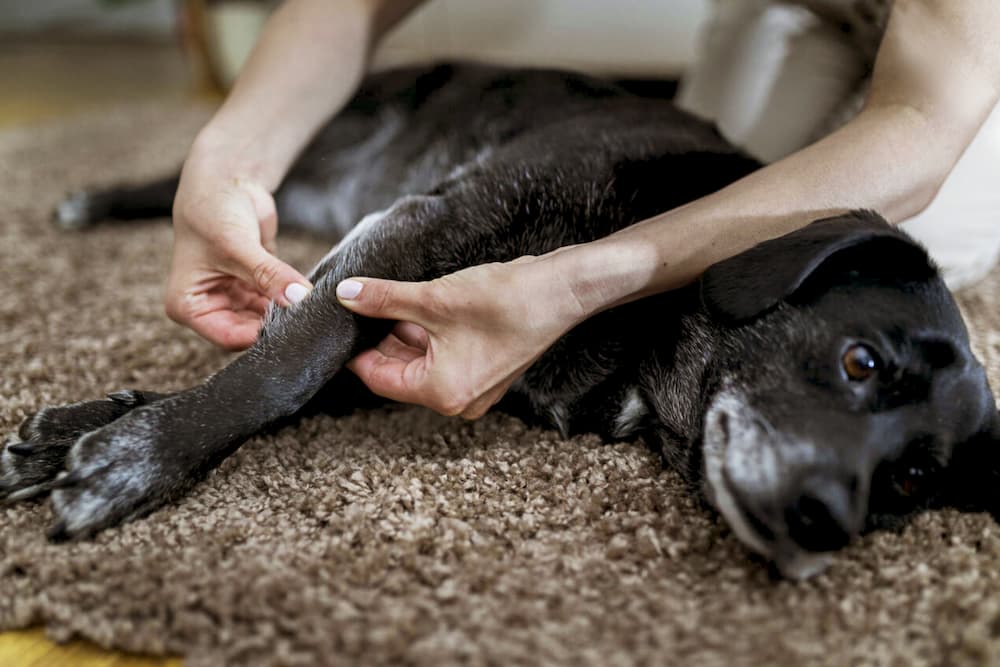Omega-3 fatty acids and in particular EPA (eicosapentaenoic Acid) and DHA docosahexaenoic Acid play a essential role in maintaining joints' health in cats and canines. The way they can help is:
Anti-inflammatory properties
Reduce Inflammation
Function: The omega-3 fat is a powerful anti-inflammatory effect. They reduce inflammation by inhibiting the production of pro-inflammatory Cytokines (and eicosanoids) and eicosanoids, which are a class of molecules.
Omega-3s have the ability to reduce inflammation and ease swelling in the joints. This is helpful for conditions such arthritis. It can improve the quality of life for pets by increasing their mobility.
Joint Lubrication and Health
Improvement of joint Lubrication
Function They are a part of the health of joint synovial lubricant.
Benefits: Improved lubrication results in smoother joints, less friction and less wear and tear on cartilage. It's especially beneficial for pets with joint issues or are at risk.
Cartilage Protection and Repair
Cartilage Protection:
Function: Omega-3s aid in the health of cartilage by inhibiting the enzymes that breakdown cartilage.
The benefits of protecting cartilage It assists in maintaining joint health by preventing degrading and can slow the progression osteoarthritis.
Immune System Support
Immune System Regulation:
Function: Omega-3 fats control the immune system, which promotes a balanced inflammation response.
Benefits of well-regulated immune systems This can help protect joints from joint inflammation and damage through the regulation of the immune system.
Comfortable Mobility and Improved Comfort
Improved Mobility
Function: By decreasing joint inflammation and protecting joints, Omega-3s aid pets move more easily.
Benefits: Many pets, particularly older pets or those with arthritis show less pain and improved mobility. This can lead to a happier and more active life.
Additional Health Benefits
Overall Health:
Function: Omega-3 fat acids can be beneficial to the health of your pet's skin, coat, and cardiovascular system.
Benefits Pets with good health tend to be more active and enjoy better joint health.
Use and Considerations
Dosage administration, dosage and dosing: The amount of Omega-3s that's appropriate for your pet is based on its size, weight and the specific health condition. You should always adhere to the advice of your vet or the instructions for the product.
Sources of Omega-3s Top-quality fish oil supplements are a typical source of EPA and DHA. Selecting products that are specifically designed for animals is vital to ensure safety and effectiveness.
Omega-3 supplements generally are suitable for dogs, however there are some who may experience gastrointestinal issues or a fishy smell. Start with a smaller dose and gradually increasing it will help minimize side consequences.
Conclusion
Omega-3-fatty acids can have an impact positive on joint health in pets and dogs. Their anti-inflammatory properties, their ability to increase joint fluidity, safeguard cartilage and strengthen the immune system contributes to better joint function and less pain. Regular supplementation can improve mobility of pets as well as encourage the healthy life. Follow the top rated here are the findings for more tips including pet echinacea supplements, pet rutin supplements, natural pet food, premium quality pet supplements, pet aloe vera supplements, pet reproductive supplements, pet supplements for pets with car anxiety, pet meat protein supplements and more.

How Can Quercetin Aid With Skin Allergies In Dogs And Cats?
Quercetin is a naturally occurring flavonoid found in many vegetables and fruits that has been proven to have several beneficial effects for treating skin allergies in dogs as well as cats. Let's take a look at the ways quercetin can assist pets suffering from allergies.
Anti-inflammatory properties
Reduction of Inflammation
Function: Quercetin's anti-inflammatory properties inhibit the production of pro-inflammatory chemicals, such as cytokines or histamines.
Benefits: Quercetin can lessen the inflammation caused by allergies to the skin, decreasing redness and swelling.
Antihistamine Effects
Natural Antihistamine:
Quercetin works by inhibiting the release of histamines in mast cells. Histamines are substances that trigger itching and other allergic symptoms.
Benefits - As an natural immunosuppressant quercetin is able to reduce itchiness and other allergic reactions and offers relief to pets with skin allergies.
Antioxidant Activity
Oxidative Stress
The function: Quercetin acts as an antioxidant to help neutralize free-radicals and limit oxidative damage.
Benefits: By reducing oxidative damage to the skin, you can minimize the damage to skin cells and encourage healing.
Immune System Modulation
Balanced Immune Response:
Function: Quercetin is a modulator of the immune response that ensures a balanced reaction to allergens.
Benefits A healthy immune system can reduce allergic reactions.
The enhancement of skin barrier function
Strengthening Skin Barrier:
Function: Quercetin helps in the production of ceramides, as well as other lipids essential for maintaining an endocrine barrier that is healthy.
Benefits: A strong skin barrier guards against environmental allergens. It also reduces the risk of infection as well as allergic reactions.
Allergy Symptom Management
The Symptom Relief
The function: Quercetin is a natural anti-inflammatory agent that helps to manage symptoms. It does this by blocking enzymes like lipoxygenase, which are involved in inflammation.
Benefits: It eases the symptoms like swelling, itching and redness. This provides comfort and relief to pets.
Usefulness and considerations
Dosage and Administration: The appropriate dosage of quercetin is based on the pet's size, weight, and health requirements. Please follow any instructions provided by your veterinarian or on the product label. Quercetin when combined with Bromelain, enhances its absorption.
Quercetin supplementation for pets comes in many forms. They include capsules, tablets as well as powders. It is essential to select a high-quality, pet-specific product to ensure the safety and effectiveness.
Side Effects Quercetin is usually safe but higher doses may cause gastrointestinal upset in some pets. If you start with a smaller dosage and gradually increasing it you can reduce the adverse effects. Checking for any adverse reactions like vomiting or diarrhea is essential.
The article's conclusion is:
Quercetin has been found to be a useful supplement for the treatment of skin allergies. Anti-inflammatory, antioxidant, and antihistamine properties of quercetin can help reduce itching and inflammation and the oxidative stress. They also help strengthen the barrier to skin while enhancing the immune system. A regular intake of qurcetin can provide significant relief for allergy symptoms. It may also help enhance the general health of the skin and improve the overall health of animals suffering from skin allergies. Follow the top lowest price on natural dog probiotics for blog examples including pet urinary tract supplements, pet lemon balm supplements, pet dandelion supplements, pet supplements for pets with allergies, pet joint supplements, pet immune support, mcdowells herbal, pet supplements for show dogs and cats and more.

How Can Cat And Dog Yeast Infections Treated With Apple Cider Vinegar?
ACV is sometimes prescribed for treating yeast infections in dogs and cats. ACV is acidic and may produce side effects. Although some anecdotal as well as research-based evidence supports its benefits, you should use it under the guidance by a veterinarian due its potential side-effects and its acidic nature. ACV is a treatment option to treat yeast infections.
Antifungal Properties
Acidic Environment:
ACV functions as an acidic product, with the pH ranging between 2.5 to 3. The acidic environment may cause an unhospitable environment yeast growth.
Benefits The application of dilute ACV topically or adding it to the bathwater of your pet may lessen the overgrowth of yeast on the skin as well as in the ears.
Skin pH Regulation
Balancing Skin pH:
ACV's purpose is to regulate skin pH. This helps maintain an endocrine-healthy barrier on the skin and impedes the growth of yeast.
Benefits: Maintaining a healthy pH balance can prevent yeast skin infections and improve the health of your skin.
Anti-inflammatory effects
Reduce inflammation
ACV contains mild anti-inflammatory properties.
Benefits of reducing inflammation: It can help reduce the symptoms that are associated with yeast infection such as itching, redness and discomfort.
Support for Digestive Health
Internal Use
ACV has been found to balance the gut flora, and improve digestion when ingested in very tiny amounts and in very dilute.
Benefits of a healthy gut environment: By enhancing immunity and microbial balance, a healthier gut environment can indirectly reduce yeast overgrowth.
Use and Considerations
Topical application: dilute the ACV with water (1 part ACV and 2 parts of water is common) and then spray or wash it on affected skin areas or ear canals. It is recommended to avoid using it directly on wounds that are open or skin that is sensitive.
Internal Use: Always consult a veterinarian prior to using it for internal use. ACV must always be diluted with water (e.g. 1 teaspoon or 1 tablespoon per cup) and taken in small dosages.
Monitoring: Look for indications of allergies or irritations during the use of ACV topically. If you have any negative reactions, discontinue using ACV.
Consultation with a veterinarian It is essential to speak with a veterinarian prior to using ACV to treat yeast-related infections in animals. They can provide guidance on the proper dosages applications, methods of application and potential risks, based on the individual health requirements of your pet.
End of Service
Apple cider vinegar might provide benefits in the treatment of yeast infections in dogs and cats However, its use must be done with care and under the supervision of a vet. ACV may have mild anti-inflammatory properties, and its acidic nature may help to create an environment that is not favorable for yeast growth. To prevent irritation and negative reactions, it's essential to apply ACV with caution. ACV treatment is only safe in the presence of veterinary guidance. Take a look at the best yeast infections in dogs info for blog examples including pet immune system supplements, pet supplements for pets with separation anxiety, pet supplements for pets with elbow dysplasia, pet glucosamine supplements, pet supplements for pets with muscle weakness, pet supplements for rescue pets, pet digestive enzymes, pet echinacea supplements and more.
